The Superhero Schools of Philadelphia

By: Chris Unger
Much like Tom Vander Ark, wherever I go I make sure to visit the schools that are “doing school” differently. Upon visiting Philly recently, I was so moved by the schools I visited that I felt compelled to share what I saw, particularly because they were all working to simultaneously address the challenges of poverty their students were growing up in and providing them with the kind of authentic, agency-oriented learning practices more often seen in the cutting-edge schools in upper-middle income communities.
I call these communities “superhero schools” because of what they are doing with their students in the context of tremendous challenges. Educators at the Workshop School, Building 21, U School, and Vaux Big Picture School have dedicated their life’s work not just to personally making a difference in the lives of their youth, but also creating a school model that has the potential to make a difference in the lives of youth in similar communities beyond.
The Schools They Are Growing
On the corner of Hanson and Locust Streets is a nondescript building that looks like any other where several light manufacturing businesses, auto body shops, and apartment buildings co-exist away from downtown, except for one door that stands out for its unique silver-painted entrance with gears welded to its front and a circular metal overhang that says ‘The Workshop School.’ Inside exists the school Simon Hauger and Matt Riggan have created, a school 10 years in the making.
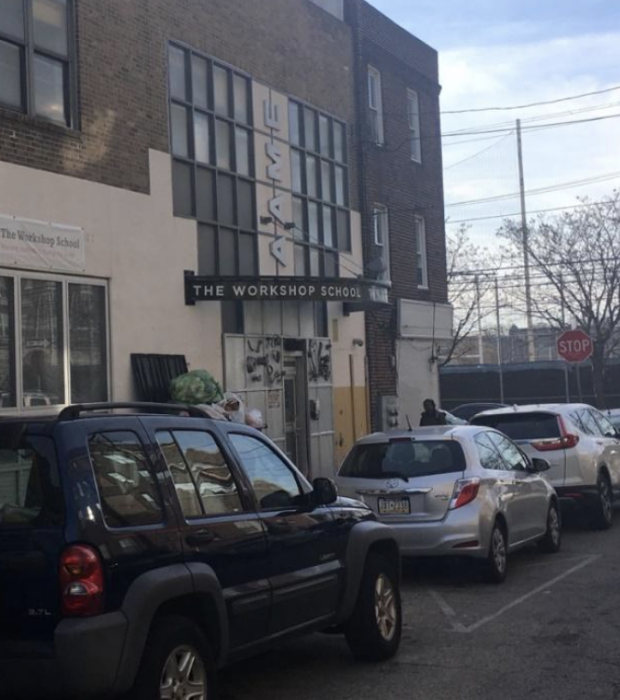
Through that door and up the stairs one enters a maze of rooms and creation spaces where students are working earnestly on a variety of hands-on, real-world projects—hence the name “Workshop School.” Today each class is reflecting on the escape rooms they created and experienced the night before (for one another, their parents, and the community). In the bowels of this building there is an automotive repair shop inclusive of a professional heat room for painting cars, and a wood shop with power saws, drills, tools, sanders, and a laser cutter to “make things.” As our two student guides showcased the classrooms, they also told us about the internships they were undertaking in keeping with their college aspirations.
I have seen such places across the country in suburbs and middle- and upper-class communities, but rarely have I seen such vibrant, student-centered, competency-based programs in the center of inner-city neighborhoods where the average family income is $14,000 and the degree of hardship and trauma is such a significant reality for its youth.

David Bromley of Vaux Big Picture School and Laura Shibulla of Building 21 probably put it best when they each spoke of their determined effort to pursue competency-based, real-world learning while at the same time acknowledging the circumstances and hardships of their students’ lives. Having a school counselor or even a social worker on staff is not enough to serve the needs of their students. For everyone in these schools, knowing and attending to who their students are and their reality is a full-time gig.
To meet students where they are the schools have made advisory and restorative justice practices a fundamental part of their everyday effort, recognizing that relationships are fundamental to their students’ success. As two of the schools’ leaders noted, on the ACE (Adverse Childhood Experience) Questionnaire, their students have been exposed to as many as six if not more of the ten adverse childhood indicators, meaning, in short, that they are exposed to extremely challenging experiences. When youth are living in such conditions, they are prone to disconnect, tune out, drop out, and often act out, with a number of triggers easily setting them off. Hence, the teachers and school leaders in these schools actively work to meet their students where they are at and let them know that the adults are there for them—in support of their resiliency. Sitting at a table with seven of the students at Building 21, they outright told me that and told me that that made all the difference. The culture of these schools is not to disregard their experience, but to recognize them and then engage in the caring practices that help students open up to learning—a possibility made even more likely when students see their learning as meaningful, connected to their interests, and supported by those that actually care for them.
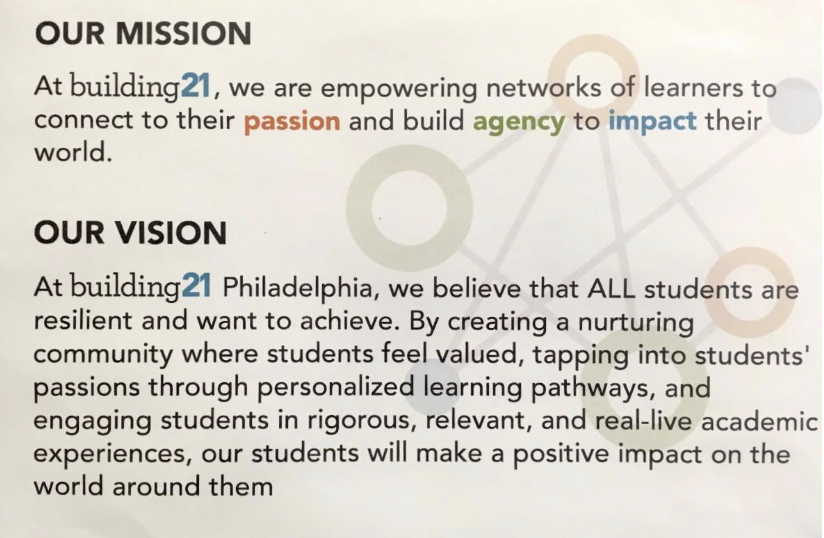
Love, Dream, Do
The U School on North 7th Street looks like any other three-story school building in Philly, except for the U School logo that sits atop the black double front doors. What does the U in U school stand for? U, as in who U are? U for Youth. And U for Unique, as in Unicorn, meaning you are as unique as a unicorn. The school’s mission is to support the development of your individual identity. The focus: “supporting students to accept challenges and opportunities through: student agency, real-world problem-solving, developing engaging high-quality products with the purpose of demonstrating mastery.” They do this through a shared design framework that supports the pursuit of Love, Dream, and Do, within which students take on real-world, “wicked problems” and are guided to pursue the personal actions they can take to meaningfully address them.
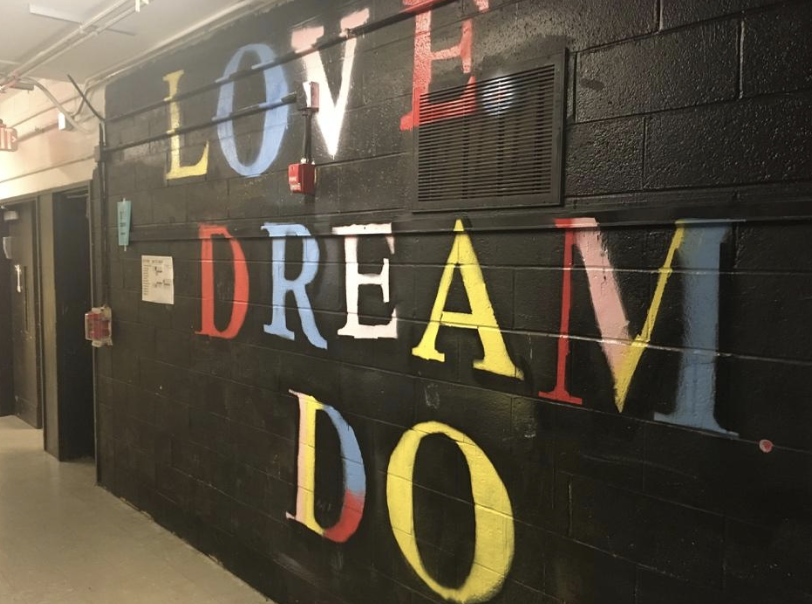
While visiting the school, I had the opportunity to talk with two young men who were on fire about their school’s literary magazine, who with great pride gave me their latest volume of student poetry. And I was able to chat briefly with a composed but equally passionate young woman similarly on fire about leading the U School’s dance club. Apart from this, I ventured into a classroom RICH with agency, where Freda Anderson, a second-year teacher in the school, runs her “activism” classroom, the walls a spellbinding collage of images and sayings that relay the spirit of the school’s design process: Discovery, Define, Design, Develop, Delta. Freda, herself a volcano of passion for making a difference in the world, is passionate about empowering youth to consider how they can make a difference in their community. Another sign that the school is about giving students agency.
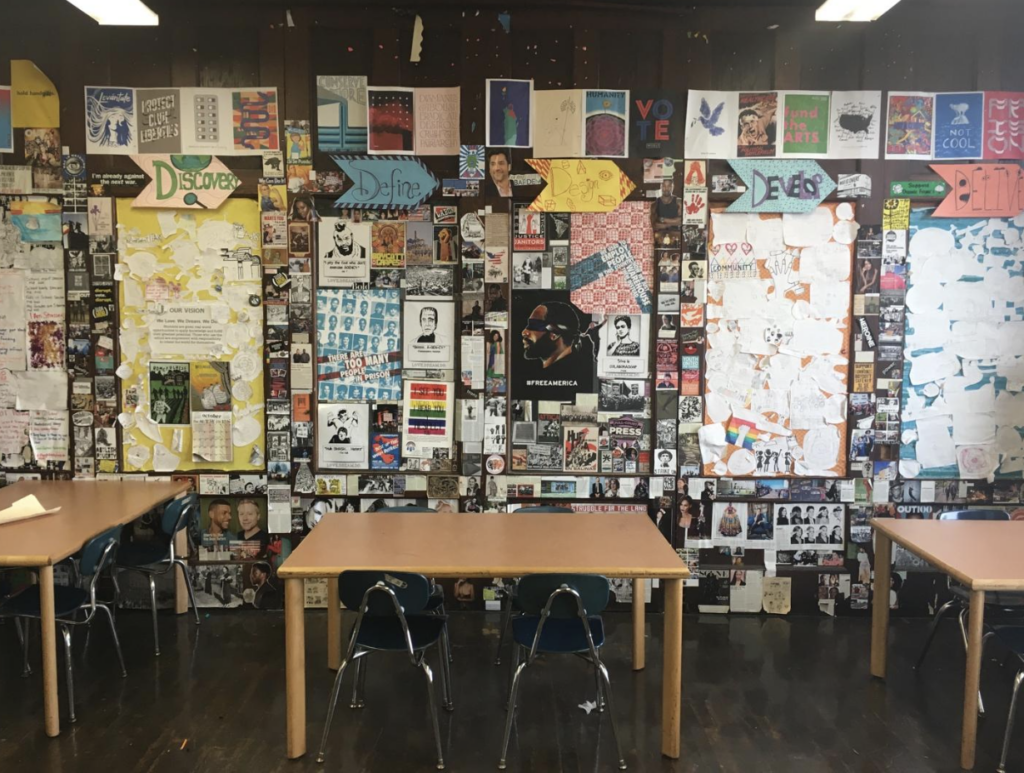
The Work Is The Work
On a wall entering the Workshop School is a saying: “The work is the work.” For me the highlight of these small schools boldly and courageously doing what they do to expand the possibilities of their students’ lives lies “in the work.” From one perspective, the “work” is reimagining the competencies they feel can have a significant impact on their students’ lives, far beyond the traditional coverage of content. At another, deeper level, these schools are redefining what the focus of school should be to give students what they may need to rise above the circumstances they are in: wayfinding, personal development, and student agency. Typical schools, whether in inner city contexts or not, very rarely and in any real, substantive way, directly and explicitly focus on these particular skill sets and competencies as a school.
Absolutely central to these efforts is how each school has clearly defined their expectations of mastery and has created platforms for tracking the development of their students’ skills and competencies. Both Building 21 and U School have a clear set of competencies not only related to the typical content of schools (such as in ELA, math, and science) but then extend their expectations to personal agency outcomes such as Building 21’s Habits of Success, NextGen Essentials, and Personal Development competencies. This set of broader, deeper competencies are based on Next Generation Learning Challenges’ MyWays Student Success Framework and are tracked on their internally developed competency dashboard. Similarly, The Workshop School uses MyWays as the basis for their skills-focused graduation requirements recently approved by the School District of Philadelphia.
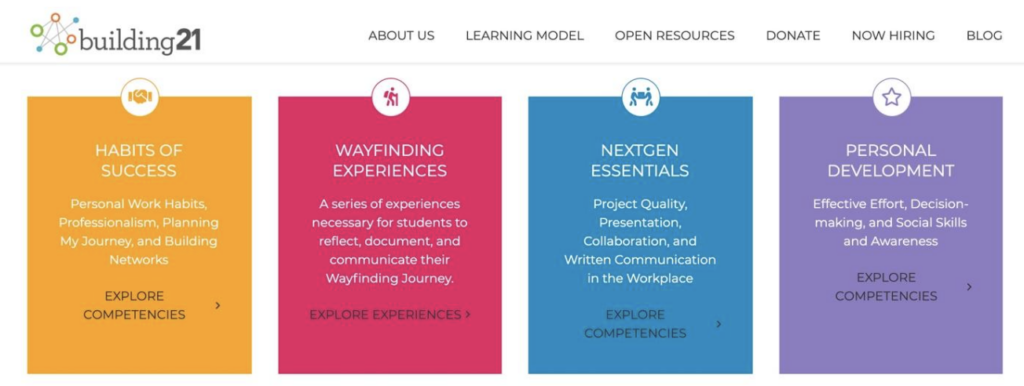
The fact that these schools, with all their challenges, are promoting and tracking such competencies above and beyond the traditional skill gaps their students exhibit is mind-boggling. It shows a deep commitment to empowering their students beyond the simple accrual of typical high school credits to helping their students envisage who they are, what they might want to do with their lives, and how they can be agents of their own future.
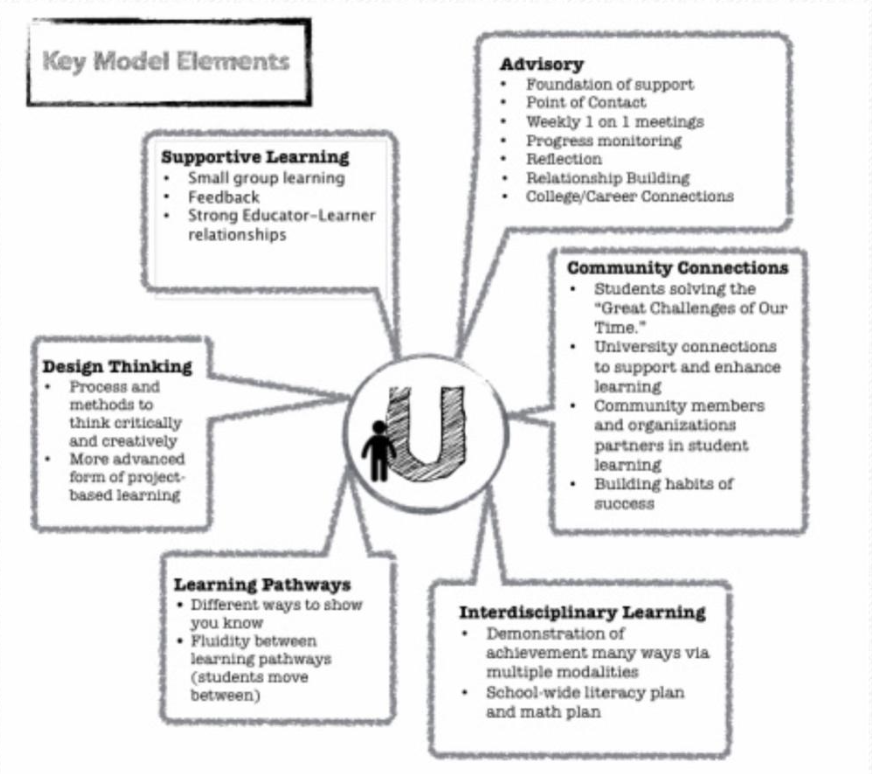
What amazes me is how these schools are boldly and courageously doing what they do to extend the possibilities of their students’ lives while also caring for who their students are, and helping them to overcome their histories and current circumstances to be empowered to be agents of their own lives.
For more, see:
- The Progressive Schools of Philadelphia
- Philadelphia Is Reimagining Arts & Creativity Education Programming
- Building 21: Bold Outcomes, Innovative Model, Next-Gen Network
Stay in-the-know with innovations in learning by signing up for the weekly Smart Update.
Chris Unger is a Teaching Professor in the Graduate School of Education at Northeastern University and supports the Graduate School of Education’s Network for Experiential Teaching and Learning (NExT) with a number of his colleagues at the University. You can follow him and NExT on Twitter @Chris_Unger and #NUNExT respectively.




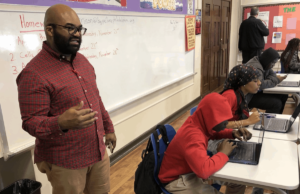
Grace Belfiore
See more about the issues raised here with regard to deeper learning, student agency, and social justice among the growing network of schools and educators that Chris and his colleagues lift up and learn from and with at the NExT website: www.northeastern.edu/next/.
I also have to add my admiration for the continued work of Building 21 and the Workshop School, with whom I was privileged to liaise in their initial efforts to leverage Next Generation Learning Challenges' MyWays student success competencies. I can second Chris's urge to highlight the work of these schools (and the U School), who are pioneering ways to authentically and explicitly center the development of the skills and competencies needed for a changing world. Sometimes the most challenging circumstances provide the best chance for fundamental change! Superhero schools for us all to keep watching.
Mike Dunn
I had the opportunity to visit two of these schools with Chris during his time in Philadelphia, and was blown away by both. I'm sure much would have been the case if I had had the opportunity to visit all four schools! What struck me on our visit to Vaux was David Bromley's understanding that so many progressive/alternative/etc. schools in any city are charter. They get students (and/or families) who are actively pursuing something different than their neighborhood school. Vaux is that neighborhood, district school. Students don't have to elect to attend. This is a major movement in the progressive school wave. Bromley and Vaux have managed to say to the district: Trust us as we provide an outstanding education for young people in this neighborhood, and students just have to show up! This is the kind of change we need in education.